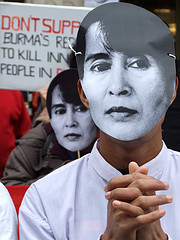Aung San Suu Kyi
Aung San Suu Kyi (1945 – ) is a pro-democracy actiist and leader of the National League for Democracy in Myanmar , a  prisoner of conscience and advocate of nonviolent resistance. She is currently under detention, with the Myanmar junta repeatedly extending her detention. According to the results of the 1990 general election, Suu Kyi earned the right to be Prime Minister, as leader of the winning National League for Democracy party, but her detention by the military junta prevented her from assuming that role. She won the Rafto Prize and the Sakharov Prize for Freedom of Thought in 1990 and the the Nobel Peace Prize in 1991.
prisoner of conscience and advocate of nonviolent resistance. She is currently under detention, with the Myanmar junta repeatedly extending her detention. According to the results of the 1990 general election, Suu Kyi earned the right to be Prime Minister, as leader of the winning National League for Democracy party, but her detention by the military junta prevented her from assuming that role. She won the Rafto Prize and the Sakharov Prize for Freedom of Thought in 1990 and the the Nobel Peace Prize in 1991.
Early Life and Education
Aung San Suu Kyi was born on 19 June 1945. Her father, Aung San, founded the modern Burmese army and negotiated Burma’s independence from the United Kingdom in 1947; he was assassinated by his rivals in the same year. Suu Kyi was educated in English Catholic schools for much of her childhood in Myanmar. Her mother was appointed Burmese ambassador to India in 1960, and Aung San Suu Kyi completed her secondary education in New Delhi in 1964.
She then went to University of Oxford (St. Hugh’s College), reading Philosophy, Politics, and Economics (graduating in 1969). Between 1969-71, she went to New York for graduate study. She postponed her masters to work for the PU.N. secretariat as Assistant Secretary, Advisory Committee on Administrative and Budgetary Questions. She went on to complete a Ph.D. at the School of Oriental and African Studies, University of London (SOAS) in 1985.
During this time, she married Dr. Michael Aris, a scholar of Tibetan culture, living abroad in Bhutan. The following year she gave birth to their first son, Alexander, in London; their second son, Kim, was born in 1977.
Political Rise
Aung San Suu Kyi spent the next decade raising her children in Bhutan and England, whilst also working as a researcher and preparing a biography of her father. She returned to Myanmar in 1988 to take care of her mother who had suffered a stroke. By coincidence, in the same year, the long-time leader of the Socialist ruling party, General Ne Win, stepped down, leading to mass demonstrations for democracy on 8 August 1988, which were violently suppressed. A new military junta took power.
Influenced by both Mahatma Gandhi’s philosophy of non-violence and by more specifically Buddhist concepts, Aung San Suu Kyi entered politics to work for democratization, helped found the National League for Democracy on 27 September 1988, and was put under house arrest on 20 July 1989. She was offered freedom if she left the country, but she refused. She was placed under house arrest in 1989, with her sons, but despite this, her party went on to win 82% of parliamentary seats in the 1990 elections.
House Arrest
She has been under house arrest during the following periods: 19 July 1989 – 10 July 1995 [her sons accepted her Nobel Prize on her behalf]; 23 September 2000 – 6 May 2002; 30 May 2003 rearrested. On 24 October 2007, reaches 12 years under house arrest, solidarity protests held at 12 cities around the world Burma Campaign UK. 27 May 2008, Myanmar’s military junta extended her house arrest another year.
Publications
- Freedom from Fear and Other Writings. Edited with introduction by Michael Aris. 2nd ed., revised. New York and London: Penguin, 1995. (Includes essays by friends and scholars.)
- Voice of Hope: Conversations. London: Penguin, 1997 and New York City: Seven Stories Press, 1997
International Voice for Peace
Internationally her voice has been heard not infrequently. Reporters with cameras and videotape have been able to interview her in person, and telephone interviews with the media outside Burma have also been published. Using video cassettes she has sent out statements, including the keynote address to the NGO Forum at the Fourth World Conference on Women in August 1995.
References
- Aung San Suu Kyi should lead Burma, Pravda Online. 25 September 2007
- The Next United Nations Secretary-General: Time for a Woman. Equality Now.org. November 2005.
- MPs to Suu Kyi: You are the real PM of Burma. The Times of India. 13 June 2007
- Walsh, John. (February 2006). Letters from Burma. Shinawatra International University.
- Deutsche Welle Article: Sentence for Burma’s Aung San Suu Kyi sparks outrage and cautious hope Quote: The NLD won a convincing majority in elections in 1990, the last remotely fair vote in Burma. That would have made Suu Kyi the prime minister, but the military leadership immediately nullified the result. Now her party must decide whether to take part in a poll that shows little prospect of being just.
- The Hon. PENNY SHARPE Speech: In 1990 Daw Aung San Suu Kyi stood as the National League for Democracy’s candidate for Prime Minister in the Burmese general election. The National League forDemocracy won in a landslide. But instead of her taking her rightful place as Burma’s new Prime Minister, the military junta refused to hand over power. Page: 52
- “Myanmar Family Roles and Social Relationships”. Government of Myanmar. Retrieved 2007-09-24.
- Miller, J. E. (2001). Who’s who in contemporary women’s writing. Routledge.
- Reid, R., Grosberg, M. (2005). Myanmar (Burma). Lonely Planet. ISBN 978-1740596954.
- Stewart, Whitney (1997). Aung San Suu Kyi: fearless voice of Burma. Twenty-First Century Books. ISBN 978-0822549314.


